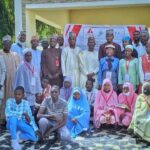With the skyrocketing prices of cooking gas and kerosene, several households are struggling to feed themselves. While those that can afford to buy foodstuffs face greater obstacles of cooking gas due to the high cost of cooking gas, students of Joseph Sarwan Tarka University, Makurdi have provided Benue residents with an alternative source with BettaCoal.
Low-income households and food businesses in Nigeria can now heave a sigh of relief in terms of cutting costs on cooking energy.
Our correspondent reports that people who spend lots of their income on cooking energy, both in urban settings and rural communities, would no longer worry as they are about replacing those high costs with a new innovation known as BettaCoal.
BettaCoal is a smokeless and affordable cooking fuel made from agricultural waste to help low-income households and food businesses in Nigeria cut costs on cooking energy while replacing firewood and charcoal to save trees and the planet.
The innovation followed the quest by some researchers at the Joseph Sarwuan Tarka University, Makurdi (JOSTUM) formerly known as Federal University of Agriculture Makurdi (FUAM) Benue State, to improve the living standard of rural communities and by extension the global community.
Dry season rice farmers get inputs in Taraba
Price of yam crashes in Niger markets
The team has since developed the innovation into a minimum viable product. Enactus which stand for ENtrepreneurship ACtion by US is an international organization dedicated to making a better world while developing the next generation of entrepreneurial leaders.
The people behind this innovation are the Enactus students of Joseph Sarwuan Tarka University Makurdi with the idea conceived by the action of Timbee Thaddeus and Bem Yangeun.
Timbee, who first conceived the idea, was inspired by the many struggles and lamentation of people in the community for a better cooking energy source that doesn’t emit thick smoke, coupled with the global need to stop the use of trees for fuel.
He recalled that, “As students of Enactus, we are challenged at all times to take leadership in our immediate community through problem identifying and needs assessments and researching solutions while coming together to share idea as a team to solve it.
“That was how the idea was birthed and the innovation is expected to save people from smoke inhalation, cut their cost on cooking energy and as well save the planet from deforestation and climate change.”
He further expatiated on the materials used to produced the fuel and threw more light on how the product works.
“BettaCoal is produced from dried agricultural waste of all kinds. Example; Corn cobs, saw dust, rice hulls and so on, and it works just like charcoal. All one needs to do is to open the package and put a small quantity in the local stove and light it. Unlike charcoal, BettaCoal lights up fast and burns without smoke for a long time, usually 2-3 hours for 1kg, and this costs just N100.
“The Enactus platform teaches and encourage students to identify pressing issues in the society and provide innovative solutions that will spark social enterprises. The Enactus network is spread across 35 countries including Nigeria.
“The Enactus team at the Joseph Sarwuan Tarka University Makurdi (JOSTUM) consists of passionate students, academic and business leaders. The team is under the watch of faculty advisors primarily Prof. Engr. Simon Irtwange who offers coaching, guidance and discipline to the students,” he said.
Thaddeus expressed optimism that the future holds an unending possibility for the innovation as he posited that, “BettaCoal started as an idea in 2020 and today we are already entering the market, in a small scale. In November 2022, we represented Nigeria in Puerto Rico, in the 2021/2022 Enactus race for climate action after beating about 99 projects across 15 countries to reach the top five (5) finalists.
“Also, in the same 2022, Enactus JOSTUM represented Nigeria in Born Germany, and in San Juan Puerto Rico at the Action with Africa challenge, emerging the 4th position with a prize of €15,000. This money will be used to scale up production and impact more people in Nigeria and if possible, beyond.
“With the level of acceptability we have secured, we are very much guaranteed of a bright future. BettaCoal is a new product actually and may take some time to capture a very big market but we are optimistic that in the long run, BettaCoal could replace charcoal and firewood in the urban Nigeria energy market and maybe Africa, if we continue doing the right thing.”
A team member, Bem Yangeun, also shares his experiences about the innovation as he emphasised that most importantly, they have been able to identify and solve a problem to improve the living standard of their immediate communities and the global community at large.
Yangeun said, “I am a member of Enactus JOSTUM team. My desire in life has always been to be able to offer solutions to challenges that the world faces every day. BettaCoal is one of the successful innovations my team and I have worked on.
“This innovation came about when we observed firstly, that there is a big challenge in the cooking energy market in terms of price and secondly, that there are health complications associated with smoke inhalation when cooking with firewood. Thirdly, there is a threat to climate change owing to the amount of trees being cut down per year for firewood, and the amount of carbon emitted into the atmosphere as a result of cooking with this same firewood, among others.
“BettaCoal came up with a solution to these problems. So far, working on BettaCoal has been a very interesting journey for myself. We have been able to push the idea into the market, secure some partnerships, and participate in global events. And most importantly, we have been able to identify and solve a problem to improve the living standard of our immediate communities and the global community which has been an awesome experience for me.
Similarly, James Thomas Terhemba, who is the current team lead of Enactus JOSTUM, expressed gratitude to God for being privileged to work with the team he described as “very passionate, driven and committed young men and women who are always looking for ways to better the world beginning from their community.”
He narrated that while working for the project BettaCoal, his team have had to identify communities, go for a need’s assessment and conduct surveys to understand the problem and what solution will best fit.
“There has been lots of problems that arose but we’ve been able to manage the problems and the rest they say is history as the idea has been given wings and it’s flying over places, countries and races. I am really privileged to have this experience,” Terhemba said.
As for Engr. Prof. Simon Irtwange, the primary faculty advisor of the Enactus team, who has been serving in the capacity of a primary faculty advisor for a very long time, his experience about the innovation is nothing short of excellence.
Irtwange said, “I have guided these students who are always conceiving great and brilliant ideas on so many community impacting innovations and this time they came with this idea of using the properties of dried agricultural waste to produce a new cooking fuel that is smokeless to replace the cutting of trees, making cooking fuel cheap and helping to reduce the number of people that are hospitalised every year occurring from the CO2 and other dangerous gases they inhale from cooking with firewood, charcoal and other materials.
“They produced prototypes and tested them, and they worked excellently. In my capacity, I then helped the team to approach the university for support which was approved by the former Vice Chancellor Professor Richard Anande Kimbir. The students competed in Germany and USA amongst several hundreds other projects and innovations in several countries collectively and still came out tops, winning grants of up to 15,000 Euro to implement and scale up. I would say this is excellent.”
Our correspondent recalled that the outgone Vice Chancellor of the University, Prof. Anande Richard Kimbir, had during his valedictory press conference penultimate week applauded the research work.
Kimbir said the innovation was one among numerous breakthroughs made by researchers in the university during his five years period of steering the school’s affairs.
“The innovation has won several awards. It’s the only innovation from Africa to make the top eight in the race for Climate Action out of 90 projects from all over the world qualifying to compete in San Juan, Puerto Rico, USA.
“BettaCoal emerged top four out of 89 entries/projects from 68 universities in 13 countries at the Action with Africa challenge sponsored by Germany Federal Ministry for Economic Cooperation and Development, Deutsche Gesellschaft for Internationale Zusammenarbeit (GIZ) GmbH and organised by Enactus HQ. It is the only team from Nigeria and sub-Saharan Africa to reach this milestone,” Kimbir said.

 Join Daily Trust WhatsApp Community For Quick Access To News and Happenings Around You.
Join Daily Trust WhatsApp Community For Quick Access To News and Happenings Around You.


